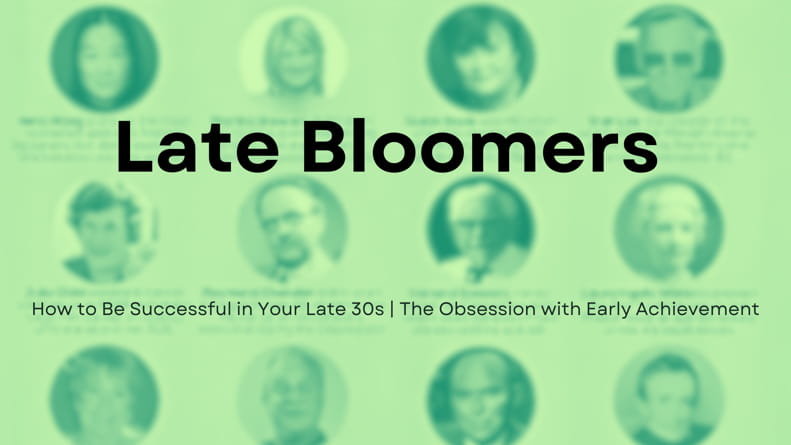How to Be Successful in Your Late 30s | The Obsession with Early Achievement
Success isn’t always about early achievements or racing against the clock. It’s about discovering your true potential at your own pace. I recently came across a deeply insightful book, Late Bloomers by Rich Karlgaard, which brilliantly addresses this very issue. Why is this book a standout? It doesn’t glorify the “superstars” or outliers but focuses on real-life challenges faced by everyday people striving to find their way later in life.
In today’s fast-paced world, the obsession with early achievement has become a cultural fixation, driven by social media, competitive education systems, and the glorification of wunderkinds. Stories of young prodigies breaking barriers and achieving monumental success by their twenties dominate headlines, creating unrealistic benchmarks for the majority. This pressure to excel early can lead to burnout, mental health struggles, and a loss of intrinsic motivation. As a result, many individuals feel inadequate or “too late” when their paths to success take longer. However, research and real-life examples show that maturity, resilience, and creativity often develop later in life, debunking the myth that success is only valid when achieved early.
Karlgaard’s idea of “late bloomers” refers to individuals in their 30s or even 40s who are still uncovering their true capabilities. For anyone navigating a phase of self-discovery or struggling to achieve long-term goals, Late Bloomers is a powerful, problem-solving guide rooted in reality.
Key Findings & Short Summary
Karlgaard emphasizes that everyone has their own timeline, unique skill sets, resources, and constraints. Whether it’s family support, education, or personal experiences, your path to success is as unique as you are. The central message? Stop comparing yourself to others and align your internal strengths with external opportunities.
Taking the longer road to success offers unexpected rewards. Along the way, you gain clarity about who you are, build meaningful relationships, and develop a deeper understanding of yourself and the world. The key is to embrace your journey fearlessly and bloom on your own schedule.
This Book is Recommended For
- Those feeling stuck in their careers or personal lives.
- Parents concerned about their children’s progress and mental health.
- Graduates and professionals unsure of their next steps in life.
What We Can Learn
- The dangers of obsessing over early achievements and how they harm mental health.
- How cultural narratives influence our definitions of success and failure.
- Practical ways to regain momentum when life feels stagnant.
Inspiring Success Stories of Famous Late Bloomers; Proving It’s Never Too Late

Late bloomers are living proof that success can come at any age, and their inspiring stories remind us that it’s never too late to achieve greatness. Colonel Harland Sanders, the founder of KFC, started his fried chicken empire at 65, proving that perseverance pays off. Jack Ma, the co-founder of Alibaba, faced numerous rejections before creating one of the world’s largest e-commerce platforms in his 30s and 40s. Oprah Winfrey, often called the “Queen of All Media,” was fired from her first TV job in her 20s, only to become a global media icon later in life. Similarly, Vera Wang didn’t design her first dress until she was 40, eventually revolutionizing the bridal industry. Even Samuel L. Jackson, now one of Hollywood’s highest-grossing actors, didn’t land his breakout role until his 40s. These late bloomers show us that life’s timeline isn’t linear and that success can emerge when passion, persistence, and preparation align.
Key Insights from the Book
The Myth of Early Success
Modern culture often celebrates wunderkinds—individuals who achieve extraordinary success early in life. From Forbes’ “30 Under 30” lists to social media highlight reels, this pressure has created a toxic benchmark for success, leading to self-doubt and despair for many.
The Pressure Cooker of Modern Life
Economic shifts and rising competition have made it harder than ever to “settle down” in your 20s. With skyrocketing educational requirements and a tightening job market, younger generations face unparalleled stress. This has contributed to a global mental health crisis, marked by anxiety, depression, and burnout.
The Science of Blooming Late
Neurological research reveals that the brain’s prefrontal cortex—the part responsible for decision-making and problem-solving—fully matures only in one’s mid-20s or later. This means many people aren’t ready to make life-altering decisions at a young age, and that’s perfectly okay.
Emerging Adulthood as a Growth Stage
Instead of rushing into long-term commitments, young adults today are exploring freelance opportunities, acquiring new skills, and prioritizing experiences over material possessions. Prolonging this phase of exploration leads to greater cognitive and emotional growth, fostering creativity and resilience.
Strengths That Develop with Age
While younger brains process information quickly, older brains excel in evaluating complex patterns, managing social dynamics, and utilizing crystallized intelligence—a lifetime accumulation of knowledge and experience. These skills often peak in the 40s, 50s, or even later, offering late bloomers an edge.
Reimagining Career Pathways
The traditional career trajectory—working until retirement at 60—is outdated. Modern workplaces should foster a blend of young talent and experienced professionals, leveraging the strengths of both groups. For late bloomers, this means the opportunity to reinvent themselves at any age.
Breaking Free from Cultural Expectations
Success doesn’t mean following a societal script. It means identifying what truly aligns with your skills, passions, and resources. From managing startups without a tech background to thriving in creative roles after years in corporate jobs, countless examples show the transformative power of reinvention.
Reinvention and Repotting
Sometimes, finding success requires uprooting your life—changing careers, environments, or even lifestyles. Like a potted plant outgrowing its container, you need to “repot” yourself into a space that allows for new growth and opportunities.
Practical Takeaways for Readers
- Acknowledge Your Journey: Accept that success isn’t linear and that delays often lead to deeper fulfillment.
- Invest in Yourself: Keep learning and growing. Whether it’s a new skill or a side hustle, growth opportunities are endless.
- Challenge the Status Quo: If your current path feels limiting, don’t hesitate to pivot.
- Prioritize Mental Health: Shift your focus from extrinsic goals (e.g., wealth, status) to intrinsic goals (e.g., purpose, satisfaction).
Credits and Final Thoughts
This article draws heavily on the groundbreaking work of Rich Karlgaard in his book, Late Bloomers. Unlike superficial success manuals, this book offers a realistic and empowering roadmap for anyone feeling stuck or out of sync with societal expectations.
Late Bloomers reminds us that success isn’t about hitting milestones early but about reaching your full potential, no matter when you start. So, whether you’re in your 30s, 40s, or beyond, remember: it’s never too late to bloom.
Pocket & Plan Team Note: Reinventing Yourself in an AI-Driven World: The Power of Unlearning and Adapting

In the fast-evolving AI-driven technological landscape, staying relevant demands more than just learning—it requires unlearning. The skills and strategies that brought you success yesterday may not serve you tomorrow. To remain ahead of the game, embrace the mindset of reinvention. Start by identifying outdated habits and beliefs that limit your growth. Replace them with agile thinking and a willingness to explore emerging technologies like AI, automation, and data-driven decision-making
Don’t be afraid to pivot your career or explore new industries—AI has leveled the playing field for late bloomers, offering opportunities to excel in fields like content creation, freelancing, and entrepreneurship. Invest in online courses, attend workshops, and join networks of like-minded professionals to stay updated on industry trends. Reinvention is not just an option; it’s a necessity. The good news? The world of AI rewards those who are willing to adapt, no matter their age or background. Take charge, unlearn what holds you back, and transform your potential into progress.







